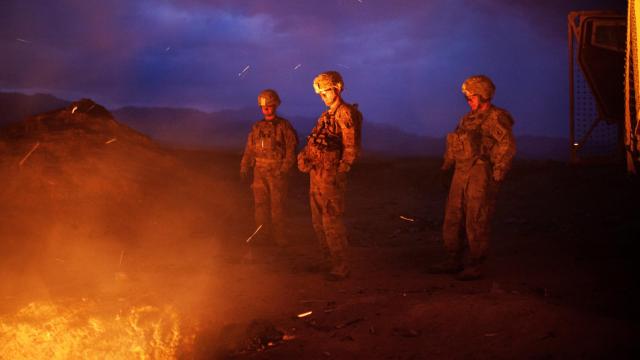The U.S. Army has a shiny new net-zero plan that might just make people forget how much of a heinous global polluter it is.
This week, the Army (the country’s oldest military branch) revealed a plan to supposedly make its operations climate friendly, including rolling out electric military vehicles and installing microgrids on its bases that will be powered by renewable energy such as solar panels. The Army will also be training its soldiers to withstand increasingly common disasters like droughts, floods, and heatwaves.
“The climate strategy is important to address the changing climate and the threats that are coming from climate change — both how our forces operate in a climate-altered world, but what the Army can do to influence this and to mitigate our greenhouse gasses and to reduce the effects of climate change,” Paul Farnan, the Army’s acting assistant secretary for installations energy and environment, told Defence News this week.
Of course, the U.S. military is one of the most polluting entities in the world — its operations burn through more resources than over 140 countries, according to a 2019 study. The military’s activities use enormous amounts of energy and water, and there are hundreds of military bases in about 70 countries around the world, according to Politico. Not to mention the direct environmental destruction it carries out. Constant war and movement displaces humans and wildlife, and burn pits and oil spills have sickened countless people, including many soldiers. Just last year in Hawaii, petroleum used for military vehicles leaked into local drinking water, sparking illnesses in residents and military families. From the 1940s to the early 2000s, the U.S. military tested munitions on the Puerto Rican island of Vieques, leaving the tropical environment riddled with toxic waste to this day. Famously, mid-century atomic bomb testing destroyed the homeland of the people of Bikini Atoll, which remains radioactive and unlivable more than 70 years later.
Electric vehicles and solar-powered grids may lower the military’s enormous appetite for oil, but net-zero on emissions is not net zero on centuries of damage to fragile ecosystems and vulnerable communities that are now living in environmental disaster. The Army’s new climate strategies will make its operations and soldiers more resilient to the crises it helped create, but they do nothing to clean up its toxic legacy.
